小学英语pep五年级下册知识点(精心整理)
小学英语人教PEP五年级下册复数记忆顺口溜
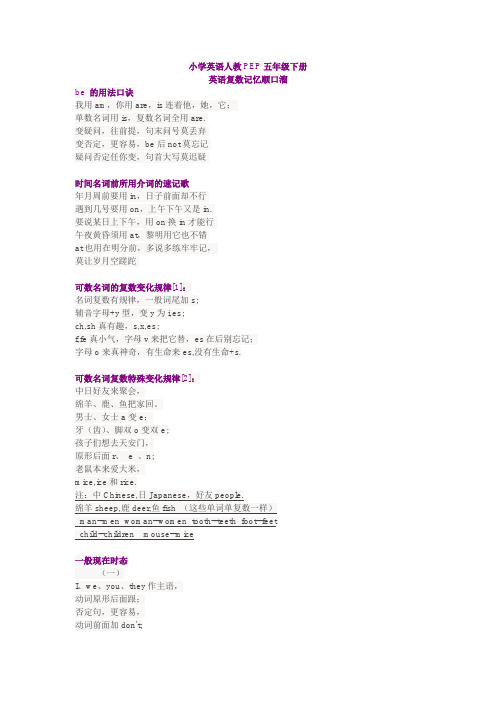
小学英语人教PEP五年级下册英语复数记忆顺口溜be 的用法口诀我用am,你用are,is连着他,她,它;单数名词用is,复数名词全用are.变疑问,往前提,句末问号莫丢弃变否定,更容易,be后not莫忘记疑问否定任你变,句首大写莫迟疑时间名词前所用介词的速记歌年月周前要用in,日子前面却不行遇到几号要用on,上午下午又是in.要说某日上下午,用on换in才能行午夜黄昏须用at,黎明用它也不错at也用在明分前,多说多练牢牢记,莫让岁月空蹉跎可数名词的复数变化规律[1]:名词复数有规律,一般词尾加s;辅音字母+y型,变y为i,es;ch,sh真有趣,s,x,es;f,fe真小气,字母v来把它替,es在后别忘记;字母o来真神奇,有生命来es,没有生命+s.可数名词复数特殊变化规律[2]:中日好友来聚会,绵羊、鹿、鱼把家回。
男士、女士a变e;牙(齿)、脚双o变双e;孩子们想去天安门,原形后面r、e 、n;老鼠本来爱大米,mice,ice和rice.注:中Chinese,日Japanese,好友people.绵羊sheep,鹿deer,鱼fish (这些单词单复数一样)man--men woman--women tooth--teeth foot--feet一般现在时态(一)I、we、you、they作主语,动词原形后面跟;否定句,更容易,动词前面加don't;疑问句,别着急,句首Do,来帮你,后面问号别忘记;肯定回答用Yes,I、we、you、they加上do;否定回答要用No,I、we、you、they加don't.(二)主语三单他、她、它,动三形式后面压,词尾一般s加;辅音字母+y型,变y为i,es;ch,sh真有趣,s,x,es;三个特殊那里去?has、goes和does;否定句,记住它,动词前面doesn't;疑问句,别着急,句首Does,来帮你;肯定回答用Yes,he、she、it加does;否定回答要用No,he、she、it、doesn't;Does、doesn't来帮你,后面动词定注意,恢复原形要切记。
人教PEP版小学五年级下册英语单元复习课件(全册)

does和doesn’t 在句中的用法
2.一般疑问句:Do(Does)+主语+动词原形+其它。 eg:Do you often play sports? 你经常做运动吗? Yes, I do. / No, I don’t. 当主语为第三人称单数时,要用does构成。 eg:Does she/he often play sports? Yes, she/he does. / No, she/he doesn’t.
语法:动词词组的固定搭配
3.have + 课程/三餐 eg:have English(上英语课), have maths(上数学课)
have breakfast(吃早餐),have lunch(吃午餐) 4.do 做什么事情
do homework(做家庭作业), do kung fu(练功夫), do morning exercises(做早操)
四、Read and translate. 英汉互译。 1. 他的英语书 _h__is_E__n_g_li_s_h_b_o_o_k 2. 我自己 __m__y_s_e_lf____ 3. my teacher __我__的__老__师__ 4. those ____那__些____
2. you (复数形式) __y_o_u_ 4. these (反义词)_t_h_o_s_e
动词变成相应的三单形式
在一般现在时中,跟在第三人称单数后面的动词也要变成相应的三单 形式。 eg: I go shopping every day. 如果主语是三单,动词要变化: He goes shopping every day. She goes shopping every day. Jane goes shopping every day.
【人教版】小学PEP英语五年级下册第五单元知识点归纳
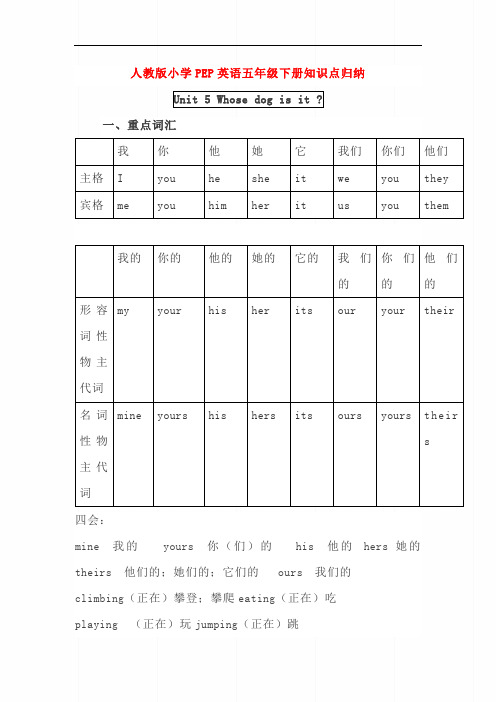
人教版小学PEP英语五年级下册知识点归纳Unit 5 Whose dog is it ?一、重点词汇我你他她它我们你们他们主格I you he she it we you they 宾格me you him her it us you them我的你的他的她的它的我们的你们的他们的形容词性物主代词my your his her its our your their名词性物主代词mine yours his hers its ours yours theirs四会:mine 我的yours 你(们)的his 他的hers她的theirs 他们的;她们的;它们的 ours 我们的climbing(正在)攀登;攀爬eating(正在)吃playing (正在)玩jumping(正在)跳drinking(正在)喝(水) sleeping (正在)睡觉三会:each 每一;各个other 其他each other 相互excited 兴奋的;激动的like 像……那样二、掌握的短语climb trees 爬树play football 踢足球look at 看 a beautiful painting 一幅美丽的画in the kitchen在厨房play with each other一起玩耍drink water 喝水listen to music 听音乐read books读书三、名词性物主代词和形容词性物主代词表示所有关系的代词叫做物主代词,即表示事物主人的代词。
它包括名词性物主代词和形容词性物主代词。
注意:1、形容词性物主代词相当于一个形容词,不能单独使用,后面需要跟名词,常用来修饰、限定后面的名词。
如:This is my book.(这是我的书。
).That is his bag.(那是他的书包。
)2、名词性物主代词需独立使用,后面不能跟名词,它相当于“形容词性物主代词+名词”。
如:It’s mine. (它是我的。
PEP小学英语五年级下册各单元知识重点总结
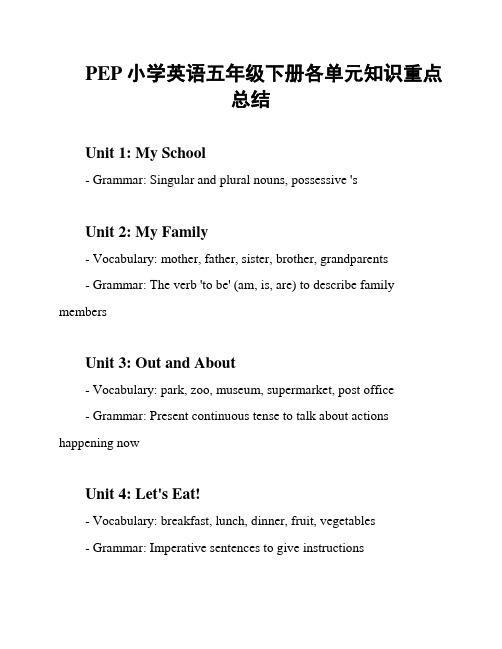
PEP小学英语五年级下册各单元知识重点总结Unit 1: My School- Grammar: Singular and plural nouns, possessive 'sUnit 2: My Family- Vocabulary: mother, father, sister, brother, grandparents- Grammar: The verb 'to be' (am, is, are) to describe family membersUnit 3: Out and About- Vocabulary: park, zoo, museum, supermarket, post office- Grammar: Present continuous tense to talk about actions happening nowUnit 4: Let's Eat!- Vocabulary: breakfast, lunch, dinner, fruit, vegetables- Grammar: Imperative sentences to give instructionsUnit 5: At the Farm- Vocabulary: farmer, barn, cow, pig, chicken- Grammar: There is/There are to talk about existenceUnit 6: Our Town- Vocabulary: street, hospital, police station, fire station, city- Grammar: Prepositions of place (in, on, under, behind, next to)Unit 7: Weather Report- Vocabulary: sunny, cloudy, rainy, snowy, windy- Grammar: Adjectives to describe weatherUnit 8: Fun with Friends- Vocabulary: play, sing, dance, swim, draw- Grammar: Simple present tense to talk about daily activitiesUnit 9: In the Ocean- Vocabulary: fish, dolphin, shark, octopus, seahorse- Grammar: Wh- questions using 'What' and 'Where'Unit 10: Happy Holidays- Vocabulary: Christmas, Easter, Halloween, New Year's Day, Thanksgiving- Grammar: Use of can for ability。
PEP小学五年级下册英语知识点总结全
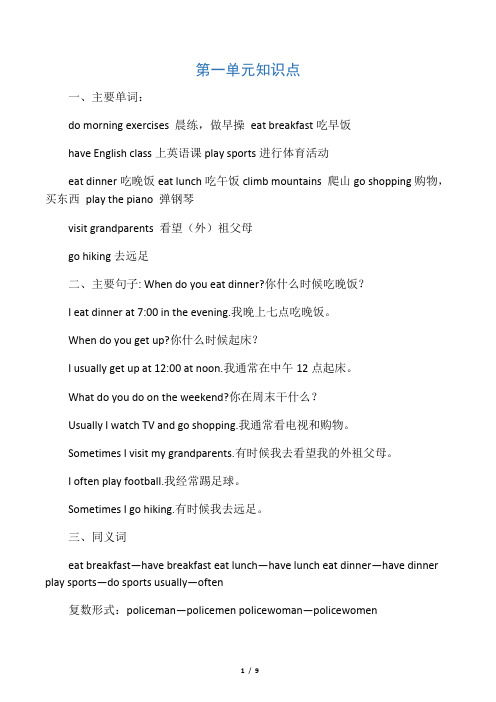
第一单元知识点一、主要单词:do morning exercises 晨练,做早操eat breakfast吃早饭have English class上英语课play sports进行体育活动eat dinner吃晚饭eat lunch吃午饭climb mountains 爬山go shopping购物,买东西play the piano 弹钢琴visit grandparents 看望(外)祖父母go hiking去远足二、主要句子: When do you eat dinner?你什么时候吃晚饭?I eat dinner at 7:00 in the evening.我晚上七点吃晚饭。
When do you get up?你什么时候起床?I usually get up at 12:00 at noon.我通常在中午12点起床。
What do you do on the weekend?你在周末干什么?Usually I watch TV and go shopping.我通常看电视和购物。
Sometimes I visit my grandparents.有时候我去看望我的外祖父母。
I often play football.我经常踢足球。
Sometimes I go hiking.有时候我去远足。
三、同义词eat breakfast—have breakfast eat lunch—have lunch eat dinner—have dinner play sports—do sports usually—often复数形式:policeman—policemen policewoman—policewomen四、表示频度的副词:always 总是,一直usually 通常,常常often 经常sometimes 有时候五、以复数形式出现的词组:visit grandparents plant trees六、介词后跟表示时间的词语时,表示在某年、某月、某个季节,某个时候(在上午,在下午,在晚上)用in;表示在某一天,在星期几用on,在具体的几点几分用at.七、too 和either的用法区别:too和either都是“也”的意思,但too用于肯定句,either用于否定句。
小学英语人教版PEP五年级下册1-6单元知识点总结

Unit1 My day一、基本句型1.询问什么时候做某事:- When do you ……?你什么时候……?- I usually…at …. 我通常在…(点钟)…。
例:-When do you eat breakfast?-I eat breakfast at 7:00.2.What do you do on the weekend?你周末做什么?- I +频率副词+周末活动+时间。
或Sometimes I+周末活动例句:I sometimes go shopping with my mum on the weekend.(周末我时候和妈妈一起去购物)二、知识点:1.频率副词:always(总是,一直)>usually(通常)>often(经常)>sometimes(有时)2.只有Sometimes可以放在句首。
(Sometimes I cook dinner.)3.On the weekend 在周末on Saturdays 在周六on Sundays在周日(别忘加s)Unit2 My favourite season1.-Which season do you like best? (你最喜欢哪个季节?)Why?(为什么)-I like +季节+ best.(I like spring∕summer∕fall∕winter best) Because ___________.(因为)或:-What‘s your favourite season? -My favourite season is spring∕summer∕fall∕winter.2.-Why do you like winter best?(你为什么最喜欢冬天?) -Because______.二、知识点:1.leaf(树叶):复数leaves2.W,W真神奇,问出许多大问题。
what,what,问“什么”,when,when,问“时间”,where,where,问“哪里”,which,which,“哪一个”,why,why,“为什么”.Unit3 My school calendar补充:1.Dragon Boat Festival 龙舟节或端午节(农历五月五日)一般在阳历6月2.月份首字母大写。
人教PEP版小学五年级下册英语第三单元知识点
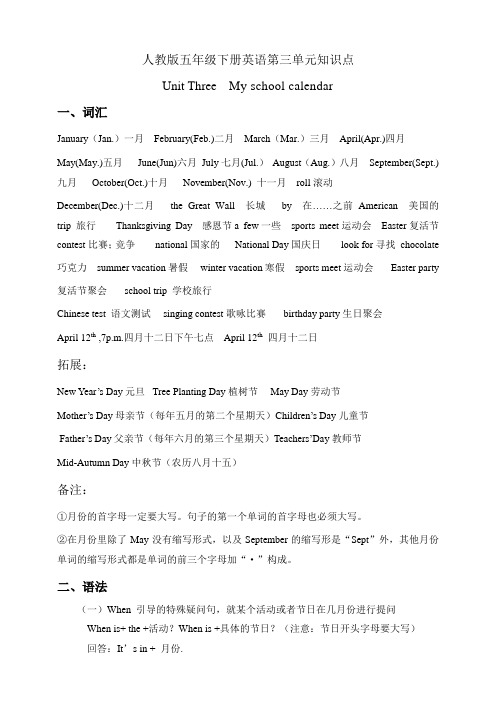
人教版五年级下册英语第三单元知识点Unit Three My school calendar一、词汇January(Jan.)一月February(Feb.)二月March(Mar.)三月April(Apr.)四月May(May.)五月June(Jun)六月July七月(Jul.)August(Aug.)八月September(Sept.)九月October(Oct.)十月November(Nov.) 十一月roll滚动December(Dec.)十二月the Great Wall 长城by 在……之前American 美国的trip 旅行Thanksgiving Day 感恩节a few一些sports meet运动会Easter复活节contest比赛;竞争national国家的National Day国庆日look for寻找chocolate 巧克力summer vacation暑假winter vacation寒假sports meet运动会 Easter party 复活节聚会 school trip 学校旅行Chinese test 语文测试 singing contest歌咏比赛 birthday party生日聚会April 12th ,7p.m.四月十二日下午七点April 12th四月十二日拓展:New Year’s Day元旦 Tree Planting Day 植树节 May Day 劳动节Mother’s Day母亲节(每年五月的第二个星期天)Children’s Day 儿童节Father’s Day父亲节(每年六月的第三个星期天)Teachers’Day教师节Mid-Autumn Day 中秋节(农历八月十五)备注:①月份的首字母一定要大写。
句子的第一个单词的首字母也必须大写。
②在月份里除了May没有缩写形式,以及September的缩写形是“Sept”外,其他月份单词的缩写形式都是单词的前三个字母加“·”构成。
PEP小学英语五年级下册单词句子总复习

PEP小学英语五年级下册单词句子总复习Unit1 this is my dayl 、你能听、说、读、写下面的的单词吗?do morning exercises晨练eat breakfast吃早饭have English class上英语课play sports进行体育活动eat dinner吃晚饭when什么时候evening夜晚,晚上get up 起床at在……点钟usually通常,一般noon中午weekend周末often经常climb mountains爬山go shopping去购物play the piano弹钢琴visit grandparents 探望(外)祖父母go hiking去远足sometimes有时候2、这些难词、难句你都会使用了吗?一When do you do morning exercises?你什么时候晨练?一I usually do morning exercises at 8:30.我通常在8:30晨练。
What do you do on Mondays\S undays…?你星期一/星期日……干什么?I usually\often\sometimes climb mountains.一How about you?= What about you? 你呢?Unit 2 my favourite season1. 你能听、说、读、写下面的的单词吗?spring春天summer夏天fall秋天winter冬天season季节which哪一个best 最;极swim游泳fly kites放风筝skate滑冰;滑冰鞋make a snowman堆雪人plant trees植树why为什么because因为sleep睡觉2.这些难词、难句你都会使用了吗?一What's your favourite season?你最喜欢哪个季节?一Winter.冬天。
--Why do you like summer? 你为什么喜欢夏季?--Because l can swim in the sea.因为我可以在海里游泳。
最新人教pep版小学英语毕业课本知识点单元复习第17课时五年级下册 Unit 5

是你的。
返回目录
4. A: Is he drinking water? 他在喝水吗?
重 B: No, he isn't. He's eating.
不是。他在吃东西。
点 句 5. A: Are these rabbits eating? 这些兔子在吃东西吗?
返回目录
8. eating (eat的-ing形式) (正在)吃 重 9. playing (play的-ing形式) (正在)玩耍 点 单 10. jumping (jump的-ing形式) (正在)跳 词 11. drinking (drink的-ing形式) (正在)喝(水)
12. sleeping (sleep的-ing形式) (正在)睡觉
返回目录
单元整体提升
一、Read and write.写出下列单词的名词性物主代词。
1.my→___m_i_n_e_____
2. your→y_o_u_r_s______
3. his→__h_i_s______ 5. our→__o_u__rs_____
4.her→_h_e_r_s______ 6. their→___th__ei_r_s___
store is ___t_h_e_ir_s___.
5. A: Look! That's my dog.
B: Yes, It's ___y_o_u__r___ dog. The dog is ___y_o_u_r_s___.
6. A: Sam and Peter, wash ____y_o_u_r___ hands.
返回目录
人教版PEP小学英语五年级下册知识点汇总(最新)
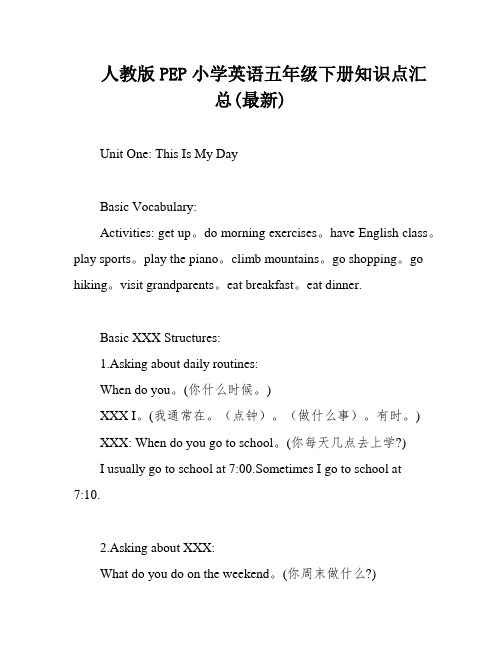
人教版PEP小学英语五年级下册知识点汇总(最新)Unit One: This Is My DayBasic Vocabulary:Activities: get up。
do morning exercises。
have English class。
play sports。
play the piano。
climb mountains。
go shopping。
go hiking。
visit grandparents。
eat breakfast。
eat dinner.Basic XXX Structures:1.Asking about daily routines:When do you。
(你什么时候。
)XXX I。
(我通常在。
(点钟)。
(做什么事)。
有时。
)XXX: When do you go to school。
(你每天几点去上学?)I usually go to school at 7:00.Sometimes I go to school at7:10.2.Asking about XXX:What do you do on the weekend。
(你周末做什么?)XXX I。
(我通常/经常。
有时。
)XXX: What do you do on the weekend?I often play XXX I go shopping with my mom.3.Introducing one's own habits:Every weekend。
I go hiking。
(我每个周末远足。
)Every day。
I do my homework at 8:00 in the evening。
(我每天晚上8点做作业。
)4.Asking XXX:What do you do。
(你是干什么的?)Time:morning。
afternoon。
evening。
noon。
at night。
6:00.on Sunday。
PEP小学五年级英语下册知识清单

PEP小学五年级英语下册Unit 1 My day 知识清单【句型/语法知识点】一. 频度副词(放主语之后)。
always总是(100%); usually通常(80%); often 经常(60%);sometimes有时(30%);never从不(0%)二. 重点句型。
1. 询问别人什么时候做某事的句型及回答。
句型结构:问:When +助动词do/does + 主语(非三单/三单)+ 动原+ 其他?答:①主语(非三单)+(频度副词)+动原+ at + 时间点.例:问:When do you go to bed?答:I go to bed at 9:00p.m答:②主语(三单)+(频度副词)+动词三单形式(动词s/es)+ at + 时间点.例:问:When does Amy go to bed?答:She goes to bed at 9:00 p.m.2. 询问别人周末做什么的句型及回答。
句型结构:问:What +助动词do/does + 主语(非三单/三单)+ do + on the weekend?答:①主语(非三单)+(频度副词)+动原.例:问:What do you do on the weekend?答:I usually read books.答:②主语(三单)+(频度副词)+动词三单形式(即动词s/es).例:问:What does Amy do on the weekend?答:She often goes shopping with her mother .三.句型转换:1.肯定句↔一般疑问句:I usually get up at 6:00. ↔ Do you usually get up at 6:00?肯定回答:Yes, I do. 否定回答:No, I don’t.(第三人称时) He eats dinner at 6:00p.m. ↔ Does he eat dinner at 6:00p.m.?肯定回答:Yes, he does. 否定回答:No, he doesn’t.2.肯定句↔否定句:I like playing the piano. ↔ I don’t like playin g the piano.I can play the piano. ↔ I can’t play the piano.3.划线提问:⑴ I often go shopping on the weekend. → When do you go shopping ?⑵ I often go shopping on the weekend. → What do you do on the weekend?⑶ I go to school at 7:00. → When do you go to school?四. 语音:cl /kl/ clean clock class clever pl /pl / plate eggplant please playPEP小学五年级英语下册Unit 2 My favourite season 知识清单【四会单词】【重点句型】【句型/语法知识点】一. 重点句型1. 询问别人天气怎么样的句型及回答。
PEP小学英语五年级下册重点句型归类
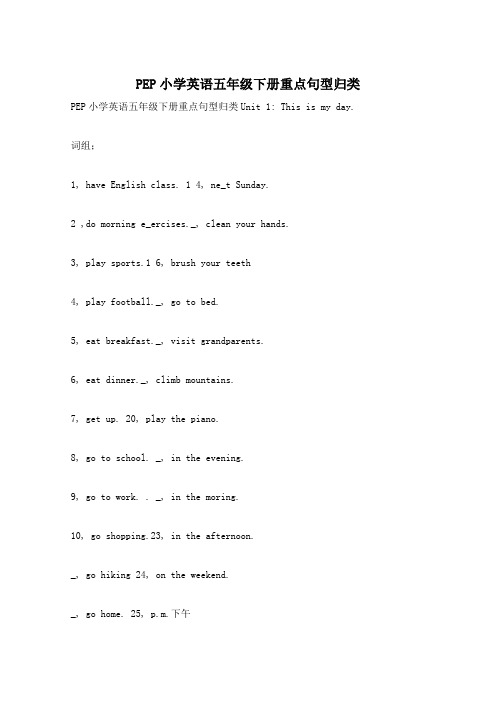
PEP小学英语五年级下册重点句型归类PEP小学英语五年级下册重点句型归类Unit 1: This is my day.词组;1, have English class. 1 4, ne_t Sunday.2 ,do morning e_ercises._, clean your hands.3, play sports.1 6, brush your teeth4, play football._, go to bed.5, eat breakfast._, visit grandparents.6, eat dinner._, climb mountains.7, get up. 20, play the piano.8, go to school. _, in the evening.9, go to work. . _, in the moring.10, go shopping.23, in the afternoon._, go hiking 24, on the weekend._, go home. 25, p.m.下午_, clean my room.26, a.m.早晨 27, noon. 中午28, When do you +动词词组?When do you play sports?I usually play sports at 3:00.29, When does he/she do morning e_ercises?He/She usually does morning e_ercises at 9:00.30, What about you?==How about you?==And you?31, Can I ask you some questions? Sure.32, What do you do? I am a policeman/student.33, Thank you for telling me about your day. 谢谢你能告诉我关于你的一天。
人教PEP版小学五年级下册英语第二单元知识点
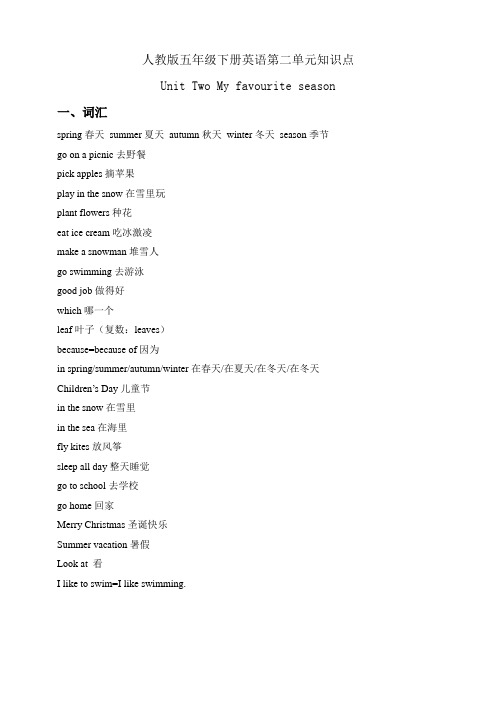
人教版五年级下册英语第二单元知识点Unit Two My favourite season 一、词汇spring春天summer夏天autumn秋天winter冬天season季节go on a picnic去野餐pick apples摘苹果play in the snow在雪里玩plant flowers种花eat ice cream吃冰激凌make a snowman堆雪人go swimming去游泳good job做得好which哪一个leaf叶子(复数:leaves)because=because of因为in spring/summer/autumn/winter在春天/在夏天/在冬天/在冬天Children’s Day儿童节in the snow在雪里in the sea在海里fly kites放风筝sleep all day整天睡觉go to school去学校go home回家Merry Christmas圣诞快乐Summer vacation暑假Look at 看I like to swim=I like swimming.二、语法(一)Which引导的特殊疑问句,就最喜欢的季节是哪一个进行提问Which season do you like best?回答:I like+季节+best.或者I like+季节.或者直接说季节名称。
拓展:What is your favourite season?回答: My favourite season is+季节.季节+is my favourite season.(二)What引导的特殊疑问句,就天气进行提问What is the weather like today?回答:It is......(三)What引导的特殊疑问句,就在某一个季节做某事进行提问What do you often do in +季节?回答:I often+具体的事情.三、重要句子Which season do you like best?I like spring best.Why do you like autumn best?Because the colours are pretty.There are beautiful flowers everywhere.I can sleep all day.How about you?=What bout you?I like summer best.because of Children’s Day.Look at my picture.The weather is good and the colours are beautiful.There is lots of snow.I want to paint a picture ,too.What is your favourite season?My favourite season is spring四、语音(辅音字母组合发音)①br发音为/br/br own li br ary br other um br ella br eakfast②gr发音为/gr/gr een gr apes gr andpa gr ow gr ass gr eat五、拓展①Why和because的用法Why 引导询问原因的特殊疑问句。
(完整版)人教版小学PEP英语五年级下册知识点归纳

人教版小学PEP英语五年级下册知识点归纳PEP五年级英语下册各单元知识点Unit 1 My day一、重点词汇。
1.四会词汇:eat breakfast 吃早饭 have···class 上······课play sports 进行体育运动exercise 活动;运动 domorning exercises做早操eat dinner吃晚饭clean my room 打扫我的房间go shopping 去买东西;购物go for a walk 散步take学习;上(课) dancing跳舞;舞蹈 take a dancing class 上舞蹈课2. 三会词汇:when什么时候after 在(时间)后start 开始usually 通常地;惯常地Spain 西班牙late 晚;迟 a.m. 午前;上午 p.m. 午后;下午why 为什么shop 去买东西;购物work 工作last 上一个的;刚过去的sound 听起来好像also 还;也busy 忙的 need 需要play 戏剧;剧本letter 信live 居住island 岛always 总是;一直cave 山洞;洞穴go swimming 去游泳 win 获胜二、其他日常活动。
get up起床 eat lunch吃午饭 go to bed 上床睡觉wash my face洗脸 wash my clothes 洗我的衣服 watch TV看电视play ping-pong打乒乓球 playthe pipa弹琵琶 go swimming去游泳go running去跑步 do homework 做作业 do kung fu练武术play football踢足球 play basketball打篮球三、频度副词。
always总是,一直(100%) usually通常(80%)often 经常(60%) sometimes(30%)有时四、疑问词。
PEP小学英语五年级下册第一单元知识点归纳

PEP小学英语五年级下册第一单元知识点归纳一、主要单词:drningexerises晨练,做早操eatbreafast吃早饭haveEnglishlass上英语plasprts进行体育活动eatdinner吃晚饭eatlunh吃午饭libuntains 爬山gshpping购物,买东西plathepian弹钢琴visitgrandparents看望(外)祖父母ghiing去远足二、主要句子:hendueatdinner?你什么时候吃晚饭?Ieatdinnerat7:00intheevening我晚上七点吃晚饭。
hendugetup?你什么时候起床?Iusuallgetupat12:00atnn我通常在中午12点起床。
hatdudntheeeend?你在周末干什么?UsuallIathTVandgshpping我通常看电视和购物。
SetiesIvisitgrandparents有时候我去看望我的外祖父母。
Iftenplaftball我经常踢足球。
SetiesIghiing有时候我去远足。
三、同义词:eatbreafast—havebreafasteatlunh—havelunheatdinner—havedinnerplasprts—dsprts复数形式:pliean—plieenpliean—plieen现在分词:tell—telling三单:sa—sas同义句:hatdud?或hatareu?对应的第三人称单数形式:hatdeshe/shed?或hatishe/she?(他/她是做什么工作的?)四、表示频度的副词:alas总是,一直usuall通常,常常ften经常seties有时候never从不频率由高到低排列:alas〉usuall〉seties〉never五、以复数形式出现的词组:visitgrandparents,planttrees六、介词后跟表示时间的词语时,表示在某年、某月、某个季节,某个时候(在上午,在下午,在晚上)用in;表示在某一天,在星期几用n,在具体的几点几分用at 例如:用介词in:inXX(在XX年),ina(在五月),insuer(在夏季),intherning(在早上),intheafternn(在下午),intheevening(在晚上)用介词n:nnda(在周一),nhildren’sDa(在儿童节这一天)用介词at:atnn(在中午),atnight(在子夜),at10:00(在十点钟)七、t和either的用法区别:t和either都是“也”的意思,但t用于肯定句,either 用于否定句。
- 1、下载文档前请自行甄别文档内容的完整性,平台不提供额外的编辑、内容补充、找答案等附加服务。
- 2、"仅部分预览"的文档,不可在线预览部分如存在完整性等问题,可反馈申请退款(可完整预览的文档不适用该条件!)。
- 3、如文档侵犯您的权益,请联系客服反馈,我们会尽快为您处理(人工客服工作时间:9:00-18:30)。
Unit 1 This is my day
四会单词及词组:
四会句子:
When do you eat dinner?你几点钟做早操?
I usually eat dinner at 7:00 in the evening?.我通常七点钟吃早饭。
When do you get up? 你几点起床?
I usually get up at 12:00 noon.我通常在12点起床.
What do you do on the weekend?你周末干什么?
Usually I watch TV and go shopping. Sometimes I visit my grandparents.我通常看电视和购物,有时我还去看望祖父母.
I often play football. Sometimes I go hiking.我经常踢足球,有时去远足
Unit 2 what’s your favourite season?
四会单词和词组:
season 季:spring春天summer 夏天fall 秋天winter冬天
which 哪一个why为什么because 因为best 最好swim游泳sleep 睡觉fly kites放风筝skate滑冰plant trees 种树make a snowman堆雪人四会句子:
Summer is good, but fall is my favourite season.
夏天不错,但秋天是我最喜欢的季节。
Why do you like summer?你为什么喜欢夏天?
Because I can swim in the lake.因为我能在湖中游泳。
Why do you like winter?你为什么喜欢冬天?
Because I can sleep a long time.因为我能长长地睡上一觉。
unit3 My birthday知识点
四会单词
January (Jan.) 一月 February (Feb.) 二月 March (Mar.) 三月April 四月 May五月 June六月
July七月 August(Aug.)八月 September(Sept.)九月October(Oct.)十月 November( Nov.) 十一月 December(Dec.) 十二月
birthday生日
四会句子:
When is your birthday?你的生日在什么时候?
It’s is in May.我的生日在五月。
My birthday is in June. Uncle Bill’s birthday is in June, too.
我的生日在六月.比尔叔叔的生日也在六月。
Is her birthday in June? Yes.她的生日在六月吗?是的。
What’s the date?几月几日?
June 9th .六月九日
Unit 4 what are you doing?
四会词组:(表示正在进行)
Drawing pictures 正在画画cooking dinner正在烧菜reading a book 正在读一本书answering the phone 正在接电话listening to music 正在听音乐writing a letter 正在写一封信cleaning the room 正在整洁房间writing an e-mail 正在写一封电子邮件washing clothes正在洗衣服
四会句子:
This is Zhang Peng。
我是张鹏(电话用语)。
What are you doing?你正在干什么?
I’m doing the dishes.我正在洗盘子。
I’m reading a book.我正在读一本书。
Grandpa is writing a letter.爷爷正在写一封信。
Brother is doing homework.哥哥(弟弟)正在做家庭作业。
Mom is cooking dinner in the kitchen.妈妈正在厨房里烧菜。
He’s writing an e-mail in the study.他正在书房里写一封电子邮件。
Unit 5 look at the monkeys知识点
四会单词:
flying 飞walking走running跑jumping跳swimming 游泳sleeping 睡觉climbing 爬fighting打架swinging荡秋千drinking water喝水
Unit 6A field trip知识点
四会句子
What is it doing? 它正在干什么?
It’s eating bananas. 它正在吃香蕉。
What is she doing? 她正在干什么?
She’s jumping 她正在跳跃。
What are they doing? 他们正在干什么?
They’re swimming. 他们正在游泳。
They are climbing trees. 他们正在爬树。
四会单词和词组:
taking pictures(照相) watching insects(观察昆虫)
picking up leaves(采摘树叶)doing an experiment(做实验) catching butterfly (捉蝴蝶) honey(蜂蜜) counting insects(数昆虫)
collecting leaves(收集树叶) wtiting a report(写报告)
playing chess(下棋) having a picnic(举行野餐)
四会句子:
Are you eating lunch? Yes, we are. /No, we aren’t.
你们正在吃午饭吗?是的/不是的
Are they eating the honey? No, they aren’t. /Yes, they are.
它们正在吃蜂蜜吗?是的/不是的
Is he playing chess? Yes, he is. /No, he isn’t.
他正在下棋吗?是的/不是的
Is she counting insects? Yes, she is. /No, she isn’t.
她正在数昆虫吗?是的/不是的。
